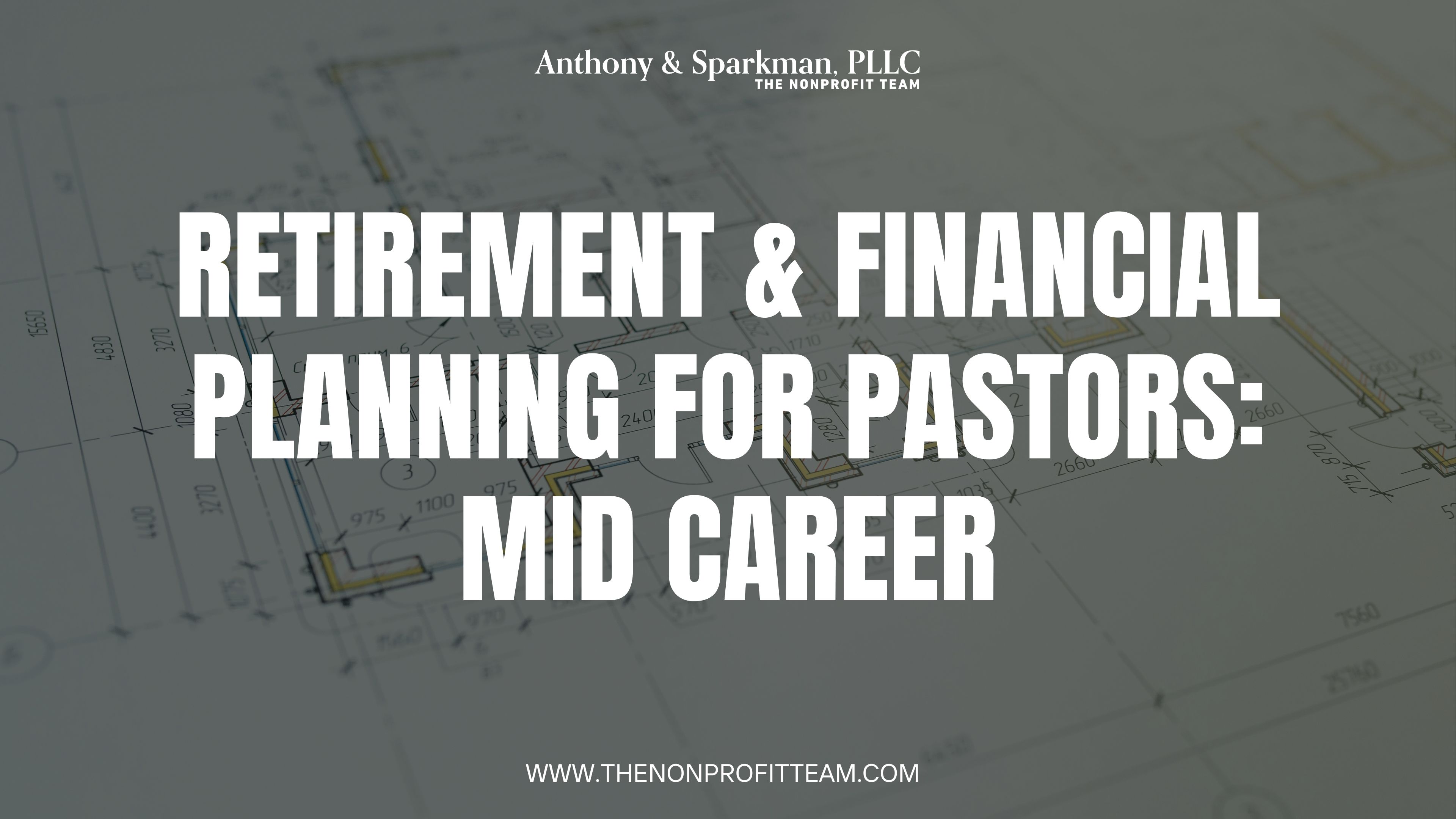
Retirement and Financial Planning For Pastors: Mid Career
Retirement planning can be overwhelming. It is often avoided or ignored by those in ministry for the simple reason that their finances are limited. Many in ministry work on a month-to-month income, and saving for the future, let alone retirement, can feel out of reach.
Smart planning in a pastor's early career can make a huge difference in their mid-career, late-career, and finally, retirement. When good practices are put into place, stability begins to grow.
As pastors enter the middle stages of their ministry careers, a new set of financial challenges evolves. At this point, many pastors have seen their income stabilize, their family grow, and their ministry responsibilities expand. It’s also the time when more complex financial decisions must be made to secure long-term financial well-being.
A mid-career financial planning check-up can have a profound impact on a pastor’s retirement.
Finances
By mid-career, your financial situation may have changed. Whether it’s due to a larger family, rising living costs, or expanding ministry responsibilities, it's important to reassess your budget regularly.
Evaluate Your Income Sources. In addition to your salary, consider any outside income you might receive, such as book royalties, speaking engagements, or part-time consulting. Make sure your budget reflects all sources of income.As families grow, so do the expenses. Take time to review your family’s needs. Education costs, extracurricular activities, healthcare, etc. Adjust your budget accordingly.
Update Your Savings Goals. Whether it’s increasing your emergency fund, saving for your children’s education, or setting aside money for a home upgrade, make sure your budget aligns with these new goals.
If you’ve been contributing to a retirement plan like a 403(b) or 401K, mid-career is the time to ensure you’re on track. By now, you should have a clearer picture of your retirement needs. Many churches offer matching contributions. Try to contribute enough to take full advantage of this benefit.
If a pastor has a 403b plan, retirement disbursements can be made as a housing allowance. This allows the disbursement to be made tax-free and used for the pastor’s housing, just as they would with a portion of their salary that is designated as a housing allowance. If you are unfamiliar with this option, please contact your retirement plan administrator, CPA, or attorney immediately.
Healthcare
Many pastors choose to opt out of Social Security in their early careers, not realizing that they are also opting out of Medicare. If a pastor has opted out of Social Security, healthcare planning is a must, and should include long-term care insurance. As your family grows and your responsibilities increase, it’s essential to ensure that you have adequate insurance coverage. Mid-career is the right time to review and update your insurance policies.
Life Insurance: If you haven’t already, consider purchasing a term life insurance policy to provide for your family in the event of your death. The death benefit can replace your income and cover future expenses.
Disability Insurance: This type of coverage is especially important for pastors who rely on their ability to preach, lead, and serve.
Long-Term Care Insurance: As you approach your late career, it’s a good idea to consider long-term care insurance. This insurance helps cover the cost of care if you become unable to care for yourself due to age or illness.
Taxes & Estate Planning
Mid-career is the time to consult with a tax professional who specializes in clergy tax laws. They can help you minimize your tax liability and ensure you're compliant with tax regulations. They can help make sure you’re taking full advantage of the tax deductions available to you, such as the housing allowance, business-related expenses, and charitable contributions.
By mid-career, a pastor should have some form of estate plan in place. Utilizing wills, trusts, and power of attorney to ensure that those you care for the most are covered. We recommend reviewing your estate plan with your attorney, executor, trustees, and beneficiaries every 5 years to help ensure that updates in the law are applied to your documents and that there are no hurdles when it is time for them to be probated and administered.
Planning for Succession and Intellectual Property
IP considerations have become a significant part of succession planning. Have conversations with your board and an attorney about the ownership of sermons, books, songs, or any creative work done during your career. Lay out a plan for the use of your NIL after you retire. The earlier you have these conversations, the smoother the retirement process will be.
Failure to plan for retirement affects more than just the individual and their spouse. Ultimately, it has a significant impact on the church as the pastor will not be able to help his church transition leadership to the next generation if they are unable to retire in some meaningful way.
Most succession planning failures our firm has seen are due to the lack of planning and funds available to the pastor for retirement. Mid-career financial planning can sort out complex issues before they ever arise.
If you haven’t started mid-career financial planning yet, now’s the time to take action. Consult with a financial planner or legal professional to ensure you’re on the right track for a secure future. If you or your organization does not have legal counsel to help guide you through this time, please reach out to us.
The information provided in this article does not, and is not intended to, constitute legal advice or investment advice; instead, all information, content, and materials available in this article are for general informational purposes only. The information contained in this article may not constitute the most up-to-date legal or other information. This article contains links to other third-party websites. Such links are only for the convenience of the reader, user, or browser; the author does not recommend or endorse the contents of the third-party sites.
Readers of this article should contact their attorney to obtain advice with respect to any particular legal matter.
Anthony & Sparkman, PLLC is a law firm with attorneys located in both Dallas/Fort Worth and Kalispell, Montana, that provides legal counsel to both churches and nonprofits around the world. John Anthony & Michele Sparkman have spent over a decade providing general counsel to churches and nonprofits on issues ranging from incorporation, governance, employment, policies and procedures, taxes, succession planning, real estate development, and much more. For more information, visit our website at www.thenonprofitteam.com.




